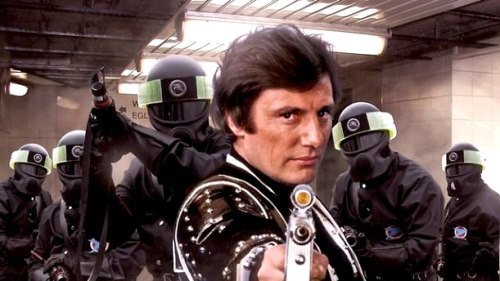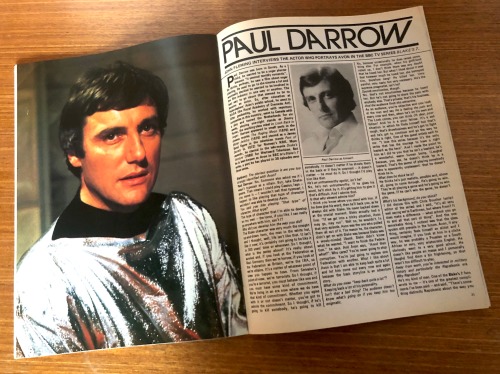
In the third, concluding extract from my 1980 chat with actor Paul Darrow, who died earlier this week, he talks about starring in Terry Nation’s TV series Blake’s 7, fans, writing and….

Blake’s 7 is vividly remembered by many possibly, in part, because of – after four series – its jaw-dropping final scenes
JOHN: Because Blake’s 7 is ‘science fiction’, people may not treat it as seriously as other drama. The “Oh, it’s only kids’ stuff” attitude.
PAUL: They originally called it a ‘kidult’ series.
JOHN: Usually the problem with science fiction is that it’s weighted towards plot and ideas at the expense of psychology.
PAUL: Well, this is where Blake’s 7 was probably successful and this is perhaps why the characters are as popular as they seem to be. The emphasis on character – whether it came from the writers or the actors themselves – was such that it created a deeper interest. People care about the characters and that’s important.
When I get fan letters, okay, some of them are admiring, some silly, some charming, but the majority are fairly reasonable and intelligent and say I care about this character. Now that’s marvellous for an actor, marvellous, because it means you’ve achieved something. The fact that it’s in science fiction doesn’t mean it’s any less good than if it were in Shakespeare. I’ve seen some pretty bad performances of Shakespeare that we wouldn’t have had in Blake’s 7.
JOHN: You seem to have some loyal fans.
PAUL: They make you what you are. I loathe some people’s attitude. There are one or two people, who shall be nameless, that I know very well who ignore letters and despise people who write in and I feel like thumping actors who say: “No, I don’t bother: I throw them straight in the wastepaper basket.”
I think if people take the trouble to write, you should reply. Without them, you’re not going to get anywhere. I just wish some of the fans knew which people these were so that they didn’t support them any more and they wouldn’t get the work. I feel very strongly about the relationship you have with the people who watch you. That’s why I go to science fiction conventions: because that’s part of my job.
JOHN: You won a Starburst Award last year. It’s hardly an Oscar, though, is it?
 PAUL: Alright, it isn’t Hollywood and it isn’t an Academy Award, but it is an award and somebody somewhere has gone to a lot of trouble to think about it and a lot of people have gone to a lot of trouble – if you count the stamps at 10p or 12p each – to write in and say who they like, so I can stand up there on the day and be feted and given an award. That means a lot; it means more than I’ve been able to convey in what I’ve just said.
PAUL: Alright, it isn’t Hollywood and it isn’t an Academy Award, but it is an award and somebody somewhere has gone to a lot of trouble to think about it and a lot of people have gone to a lot of trouble – if you count the stamps at 10p or 12p each – to write in and say who they like, so I can stand up there on the day and be feted and given an award. That means a lot; it means more than I’ve been able to convey in what I’ve just said.
And that Starburst Award I won has pride-of-place in my home. That’s the reward, the contact with the audience, which you don’t get on television. In the theatre you get it because you get the applause at the end. And it’s marvellous and I love it.
JOHN: Especially from children?
PAUL: A nine-year-old sent me a script. It was very funny, because it said:
SCENE ONE: Avon and Blake and Villa teleport down on the planet.
SCENE TWO: They arrive on the planet. Avon says: “I don’t like the look of this place.” Blake says: “Neither do I – Let’s go back.”
That was the end of the script. I thought that was hilarious. What a great idea for a gag!
JOHN: Is writing something you would like to get into yourself?
PAUL: Yes, I would. If an actor does a particular character for any length of time, he gets to know that character better than anybody else. You get to know how that character reacts with other characters and consequently you know more about the other characters than perhaps a lot of people.
JOHN: So maybe you should write a Blake’s 7 episode…

Paul Darrow wrote a Blake’s 7 novel
PAUL: I wouldn’t mind, actually. The only trouble is that, if you write for yourself, everybody says: “Oh dear me! He’s just writing so that he looks that much better!” So that’s a dodgy thing.
I’d probably have to write it for another character, so they wouldn’t be able to say that. But then you defeat the object of the exercise because your character’s the one you know about, so… A lot depends on the writers, actually.
Chris Boucher (the script editor on Blake’s 7) was very much on the right wavelength for this kind of thing. Terry Nation’s original idea was a good one. And then they got in one or two other interesting writers.
JOHN: Like Tanith Lee. As well as writing for Blake’s 7, she wrote the radio play The Silver Sky which you starred in.
PAUL: I did that because she wrote it. I didn’t even read the script before accepting because I didn’t need to. She writes well and it was a marvellous part; I think it calls out to be televised. It’s a love story set in a time warp. And those two people, who come from two different areas of time, meet and fall in love and then are destroyed. She is destroyed physically; he is destroyed as far as his personality is concerned, because he suddenly realises everything’s worthless.
JOHN: You haven’t done much radio.
PAUL: No.
JOHN: But, during the breaks in Blake’s 7, you’ve done stage plays.
PAUL: Yes. It’s to keep my hand in, really, because they’re different techniques.
JOHN: What’s the difference?
PAUL: Well, projection (of the voice) for one. With a microphone, you can be very quiet; in the theatre, you’ve got to convey a quiet emotion loudly. So it’s a different technique. Also a live audience means sustaining a performance with a beginning, a middle and an end. In television, of course, it’s all shot out of continuity.

Blake’s 7 was scheduled in peaktime on BBC1
JOHN: …but the money’s better in television.
PAUL: (LAUGHS) Well, I was about to say money’s not important but, of course, it is… As long as you get a fair whack, as long as it’s a reasonable amount to live on. But the BBC, you see, is faced with all sorts of cutbacks…
Actually, I must put in a plug for the special effects boys. Having mentioned money and cutbacks, that’s the kind of department that is faced with them and what those boys do with limited resources is amazing. It is staggering. They come in and they say: “We’ve made this gun for you” or “this bomb for you”. And it’s a working model! It works! They’re marvellous.
JOHN: Ian Scones used to do the Blake’s 7 effects and now he’s off to do the House of Hammer series for ITC.
PAUL: Yes, I’m in one of those. All about vestal virgins being sacrificed on the altar, so I’m going to spend most of my days sitting among a group of beautiful girls – it’s going to be terribly difficult, isn’t it?
JOHN: Keeping up your image.
PAUL: (LAUGHS) What image? Avon never got the girl. I’d quite like it if he did once in a while, but then I don’t think they’d cast Raquel Welch would they?



















